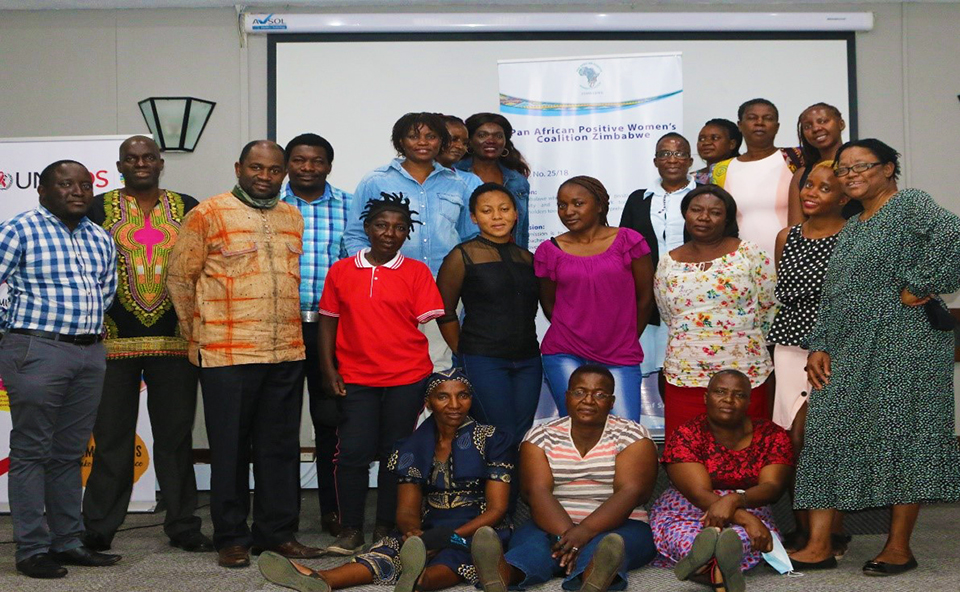Building Governance and Leadership Capacity for Women Living With HIV in Zimbabwe
Date:

The National Steering Committee of the Zimbabwe Women Living with HIV National Forum, held a three-day induction and capacity building workshop on governance and leadership from September 30th to October 2nd, 2020 at Holiday Inn, Harare. The workshop, which was supported by UN Women, UNAIDS and National AIDS Council and coordinated by the Pan African Positive Women's Coalition (PAPWC-ZIM). Representatives from different sectors and organisations participated, including the media, health sector, government, UNWomen and UNAIDS representatives.
In line with the Zimbabwe Women Living with HIV National Forum’s key objective to empower women living with HIV, they The participants were trained on governance and leadership, as critical pre-conditions for the success and growth of organisations under the umbrella of Zimbabwe Women Living with HIV National Forum. Among other key issues addressed was the importance of resource mobilisation and strengthening of sustainable livelihoods for women living with HIV.
The Zimbabwe Women Living with HIV National Forum secretariat is diverse, currently having different age groups representing their peers from various communities, and rural women from different provinces who are ready to align the workshop takeaways with their daily activities and also engage and educate their communities with the skills and knowledge they have acquired from the workshop.
In her welcoming note, Ms Tendai Westerhof, National Coordinator of the Zimbabwe Women Living with HIV National Forum expressed her gratitude for the support UN Women and UNAIDS have pledged towards Zimbabwe Women Living with HIV National Forum. “We are so excited about the support we have from UN Women and UNAIDS. We need to position women in leadership positions and ZWLHNF is putting women living with HIV in these positions”, said Ms Westerhof.
Also speaking at the workshop, the Chief Executive Officer for National AIDS Council, Dr Bernard Madzima highlighted the importance of embracing gender-sensitive policies in responding to HIV. “As we talk about the meaningful involvement of people living with HIV/AIDS (MIPA) let us also be cognizant of gender issues. As you look at the various HIV indicators, you note that the incidence of HIV is higher among young girls and women compared to boys and men. ZIMPHIA results of October 2015 showed that the incidence of HIV was 0, 59% among females compared to 0, 31% males. This then puts into perspective the need for gender-sensitive policies that address these disparities,” said Dr Madzima.
The workshop ended on a high note. The Zimbabwe Women Living with HIV National Forum secretariat was very pleased to meet and share their experience with the two heads of their supporting organisations UN Women’s Country Representative Delphine Serumaga and UNAIDS’s Country Representative Sophia Mukasa Monico. Several issues were discussed including the two Agencies’ continued support, partnerships, and the importance of capacitating women from grassroots levels as the key drivers of national development.
The workshop equipped young women with knowledge and skills to live positively with HIV. Among others, Phillis Mavushe was in attendance representing young women living with HIV in the Midlands province. She expressed her gratitude to UN Women, UNAIDS and NAC for the fruitful workshop. Ms Mavushe shared her emotional loss of friends to HIV due to lack of knowledge and skills Zimbabwe Women Living with HIV National Forum is giving now. She wished that this initiative had been in place years earlier as this would have gone a long way in avoiding such losses. “if this Forum was realised way back, I wouldn’t have lost my friends to HIV. Thank you so much UNAIDS and UN Women, with your support and mentorship we will never again lose young women and adolescent girls to HIV", she said.
Dorothy Dingindawo, representing rural women and women living with disabilities also expressed gratitude towards the effort and support they are receiving to empower and capacitate women living with disabilities and HIV in rural areas. She highlighted how this workshop has enhanced her sustainability as a disabled woman living with HIV. “I am empowered, and I don’t want anyone doing anything for me, I can do everything myself”, she said confidently.
Reflecting on the meeting, Ms Serumaga expressed her appreciation of the diversity within the Zimbabwe Women Living with HIV National Forum secretariat. She also applauded their ability to learn from each other without looking at statuses, age and physical capabilities. She went on to highlight how discrimination towards people living with HIV is still an issue to be addressed. “We still have similar conversations from the ones we had in the 1980s around issues especially of discrimination. We must break that We need to have brave people to go into communities and address those issues”, she said.
Ending on a high note, UN Women pledged its continued support to the Zimbabwe Women Living with HIV National Forum. Ms Serumaga said, “UN Women is onboard with you and shall continue to support as much as we can, with you driving the agenda”. UNAIDS also pledged their support, ‘There is a lot we can do together”, said the UNAIDS Country Representative.
According to UNAIDS Zimbabwe 2018 report, of the 1 200 000 adults living with HIV, 730 000 (60.83%) were women. New HIV infections among young women aged 15–24 years were more than double those among young men: 9000 new infections among young women, compared to 4200 among young men. HIV treatment was higher among women than men, however, with 93% of adult women living with HIV on treatment, compared to 83% of adult men. Only 46.44% of women and men 15–24 years old correctly identified ways of preventing the sexual transmission of HIV.